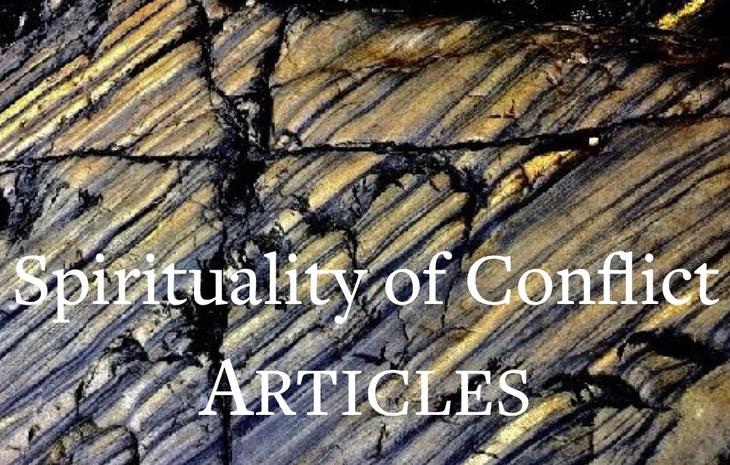By Pat Bennett
Creative Collaboration between Communities

Published in Corrymeela Magazine (Vol 16:1) Easter 2016
https://www.corrymeela.org/cmsfiles/resources/magazine-archive/Easter2016.pdf
Iona Community Programmes Development Worker Pat Bennett reflects on the experience of being part of the Spirituality of Conflict (formerly ‘Conflictus’) project – a new collaborative enterprise between the Corrymeela and Iona Communities, the Church of Scotland’s Resourcing Worship Team, Place for Hope, the Coventry Reconciliation Project and the Irish School of Ecumenics.
As someone with longstanding connections to the Iona Community – as an Associate, Member, and now also as an employee – I’ve known about Corrymeela and its Community for many years. However last Summer’s Aperture festival was my first encounter with their incarnated reality, and the welcoming, generous hospitality of both place and people was such a delight that I promised myself a speedy return to explore and enjoy them further. So it was an added bonus to becoming part of the “Conflictus” group that its first two working retreats were held at Ballycastle! Those visits in January and February have confirmed and deepened my initial impressions and I am looking forward, in my role as the Iona Community’s Programme Development Worker, to further strengthening the links between our two communities, particularly through the work growing out of the Conflictus venture.
This exciting and challenging new project – funded the JVM Trench Trust with additional support from the contributing organisations – involves representatives from each to the participating organisations working together to prepare reflections and resources to accompany the Gospel readings through the complete 3 year cycle of the lectionary. We are approaching the texts through a very specific lens – that of a spirituality of conflict. The aim is to bring about a faithful dialogue between the texts and the world which helps us to read the Gospels through the lens of conflict, and conflict through the lens of the Gospels.
At first sight this might seem a strange approach – why conflict and not reconciliation? Moreover the idea of a ‘spirituality’ of conflict itself seems somewhat counterintuitive – what would the content of such a concept even look like? These were some of the initial questions with which we grappled and on which we continue to work. An early part of the project was thus for each of us to try and articulate our understanding of what a Spirituality of Conflict might involve. Interestingly I found that in order to do this, I needed first to wrestle with my own unease over what seemed to be a a contradictory conjunction of words – a microcosm of the project in one of its foundational pieces of work!
One of the keys which helped me to pick that particular lock was Sobrino’s observation that certain attitudes which are demanded by faith generally ‘are more evidently necessary in situations of concrete conflict’*. Instead of puzzling over how to reconcile terms which seemed themselves in conflict, I began to think about how other dynamics which play an important role in the life of the Kingdom proclaimed through the Gospel stories intersect with those involved in situations of conflict.
Unsurprisingly though with such an eclectic group of contributing organisations, the approaches employed and the answers generated in trying to define a spirituality of conflict were very varied. However one of the exciting things about a collaborative venture of this nature is that these different perspectives – far from being mutually exclusive – layer over one another to produce a rich, thick, textured, and embedded understanding of different aspects of conflict – the sort of understanding which French philosopher Edgar Morin describes as ‘complex knowledge’.
Similarly our different backgrounds, interests and competencies mean that, even when using the same lens, we all bring different things to our reading of the texts. I have little experience as a conflict mediator but a deep biological and theological interest in the dynamics of relational connection – something which both neurobiological and theological anthropology place at the heart of our understanding of what it is to be human. Others bring perspectives shaped by their experiences in parish life or as practitioners in mediation, or by specific theological and textual interests. Together, over the course of the three year cycle, this shared approach will allow us to explore an aspect of human existence which, whilst ubiquitous, is far from uniform – a complex phenomenon which needs a similarly nuanced and textured understanding of its dynamics and consequences, and of how these can be negotiated.
The resulting reflections, questions, liturgies and prayers are being written with a variety of different user groups in mind and will cover the different experiences and scales of conflict from positive to pathological, private to public, low level to high level etc. All material will be released via the dedicated website https://www.spiritualityofconflict.com which will go live later in the summer with some examples of the work. There will then be a full launch in October 2016 in readiness for the start of the lectionary cycle in Advent 2016.
This is an exciting and innovative project and I am thoroughly enjoying its communal and collaborative nature: there is something about working alongside others who draw on different experiences and perspectives, have alternative ways of excavating and exploring texts, and articulate what they uncover in a different language, which is both deeply challenging and richly rewarding. I am already finding my own understandings expanded and enriched through the shared insights, laughter and – at times – conflicts of collaborative working!
I’m also relishing my evolving experience of Corrymeela, its staff, volunteers and Community – and look forward eagerly my next visit to beautiful Ballycastle.
*Jon Sobrino. Spirituality of Liberation: Towards Political Holiness (Maryknoll: Orbis, 1988), 148.